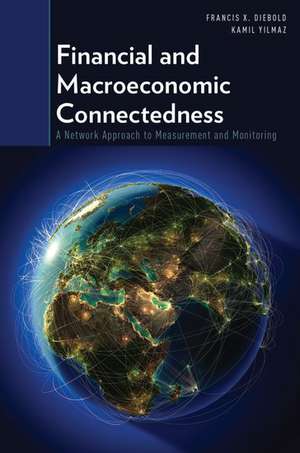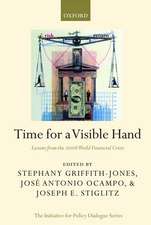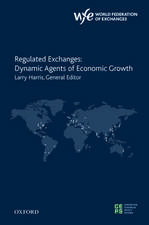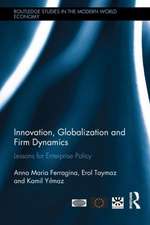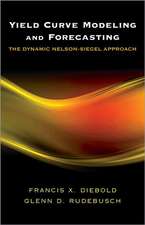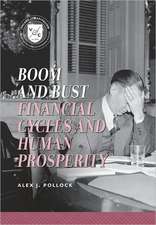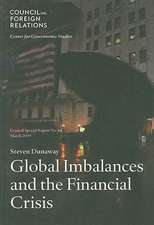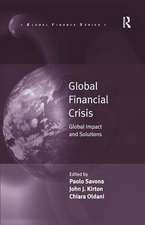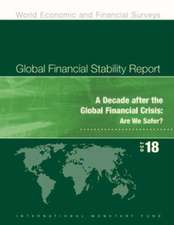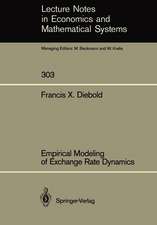Financial and Macroeconomic Connectedness: A Network Approach to Measurement and Monitoring
Autor Francis X. Diebold, Kamil Yilmazen Limba Engleză Paperback – 2 apr 2015
Preț: 326.82 lei
Preț vechi: 420.65 lei
-22% Nou
Puncte Express: 490
Preț estimativ în valută:
62.54€ • 65.53$ • 51.70£
62.54€ • 65.53$ • 51.70£
Carte tipărită la comandă
Livrare economică 31 martie-07 aprilie
Preluare comenzi: 021 569.72.76
Specificații
ISBN-13: 9780199338306
ISBN-10: 0199338302
Pagini: 288
Dimensiuni: 231 x 155 x 15 mm
Greutate: 0.41 kg
Editura: Oxford University Press
Colecția OUP USA
Locul publicării:New York, United States
ISBN-10: 0199338302
Pagini: 288
Dimensiuni: 231 x 155 x 15 mm
Greutate: 0.41 kg
Editura: Oxford University Press
Colecția OUP USA
Locul publicării:New York, United States
Recenzii
Diebold and Yilmaz's timely book develops powerful new network tools for understanding the inter-dependence of risks in large-scale financial systems. These tools shed important new light on past financial crises and will fill an important gap in the monitoring of systemic risk going forward.
The aftermath of the Lehman bankruptcy revealed that economists lacked understanding of the linkages within the financial industry and across the different sectors of the economy. The book by Frank Diebold and Kamil Yilmaz has many fresh ideas and new tools to study this very important topic. It is a must-read for anybody interested in this burgeoning area of research.
We live in a highly integrated world economy with much stronger cross-border connections today than any other time in history. We need to have a better grasp of these connections as they are now at the heart of everyday macroeconomics and finance. Diebold and Yilmaz provide a masterful framework that greatly enhances our understanding of these connections. They also open new research avenues by showing practical applications of their framework in different contexts. And all of these make their book a classical reference on the topic.
The aftermath of the Lehman bankruptcy revealed that economists lacked understanding of the linkages within the financial industry and across the different sectors of the economy. The book by Frank Diebold and Kamil Yilmaz has many fresh ideas and new tools to study this very important topic. It is a must-read for anybody interested in this burgeoning area of research.
We live in a highly integrated world economy with much stronger cross-border connections today than any other time in history. We need to have a better grasp of these connections as they are now at the heart of everyday macroeconomics and finance. Diebold and Yilmaz provide a masterful framework that greatly enhances our understanding of these connections. They also open new research avenues by showing practical applications of their framework in different contexts. And all of these make their book a classical reference on the topic.
Notă biografică
Francis X. Diebold is Paul F. and Warren S. Miller Professor of Economics, and Professor of Finance and Statistics, at the University of Pennsylvania and its Wharton School. He has published widely in econometrics, forecasting, finance, and macroeconomics, and he has served on the editorial boards of leading journals including Econometrica, Review of Economics and Statistics, Journal of Business and Economic Statistics, Journal of Applied Econometrics, and International Economic Review.Kamil Yilmaz holds PhD (1992) and MA (1990) degrees in Economics from the University of Maryland, College Park, and a BA degree in Economics from Bogaziçi University, Istanbul, Turkey (1987). He has been a faculty member at Koç University, Istanbul, Turkey, since 1994. He was a visiting professor at the University of Pennsylvania in 2003-2004 and 2010-2011 academic years. He is the recipient of the 2003 Turkish Academy of Sciences (TÜBA) Encouragement Award for Social Sciences; and a member of the American Economic Association, and the Econometric Society.
